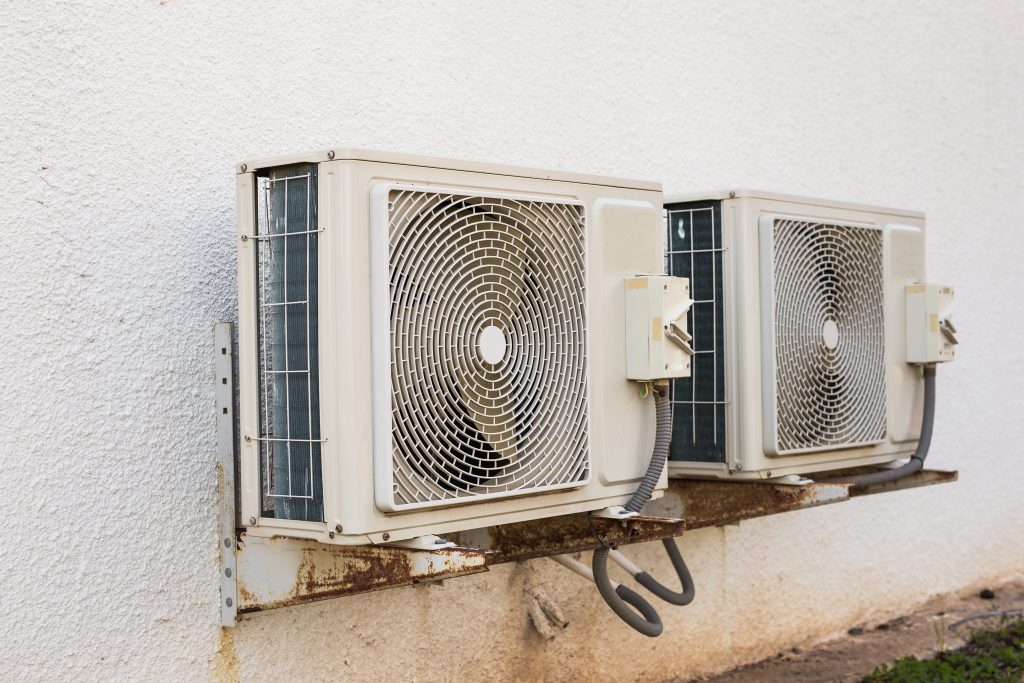The terms AC and HVAC are often used interchangeably. While both AC and HVAC systems are used for heating, ventilation, and cooling purposes, there are significant distinctions between the two.
What exactly does each acronym mean and what is the difference between AC and HVAC
What is AC?
AC stands for air conditioning. It refers to a system that is designed to cool and dehumidify the air in a confined space, such as a room, building, or vehicle. AC systems work by extracting heat from the indoor air and releasing it outside, resulting in a cooler and more comfortable indoor environment. It consists of an indoor unit that contains an evaporator coil that cools and dehumidifies the air. It then draws in warm air and passes it over the cold evaporator coil and blows out cool air into the room.
The outdoor unit contains a condenser coil and a compressor. The compressor pressurises and circulates a refrigerant between the indoor and outdoor units, transferring heat from the indoor coil to the outdoor coil. The outdoor unit then releases the extracted heat outside.
What is HVAC?
HVAC stands for heating, ventilation, and air conditioning. It is a comprehensive system that provides heating, cooling, and ventilation functions in a building, giving owners complete control over their environment.
Unlike AC, which focuses solely on cooling, HVAC systems offer a complete climate control solution for maintaining comfortable indoor conditions throughout the year. They are typically designed for commercial premises, public buildings, schools and larger residential properties and will usually allow for centralised control of the indoor environment.
What is the difference between AC & HVAC?
There are some key differences between AC and HVAC systems. Firstly, the scope of HVAC is broader than AC which focuses specifically on cooling the dehumidifying the air in a confined space.
HVAC encompasses a broader range of functions, including heating, cooling, and ventilation, and provides a comprehensive temperature control solution. While AC systems focus solely on cooling, HVAC systems also provide heating capabilities allowing them to provide warmth during colder months.
As a result of this broader scope, HVAC systems are more complex than AC systems and involve additional components and control systems.
HVAC systems also incorporate ventilation systems to ensure the circulation of fresh air and the removal of stale air, odours and pollutants. Ventilation will play a crucial role in maintaining indoor air quality. AC systems do not include dedicated ventilation components and are generally smaller in scale and simpler in design compared to HVAC systems.
AC systems will often be standalone units that are controlled individually and will have their own thermostat. HVAC systems will usually be linked to advanced controls, allowing for comprehensive room-by-room control of cooling and heating.
Because of their scope and complexity, HVAC systems will cost more to install than a standalone AC unit but do deliver benefits in terms of energy efficiency and cost savings over time.
What are the benefits of having an HVAC system over an AC system?
An HVAC system offers numerous advantages over a standalone AC system. They provide comprehensive climate control, incorporating heating, ventilation, and air conditioning functions. This means you can maintain comfortable temperatures throughout the year, adjusting the system to meet your specific needs regardless of the season.
HVAC systems also tend to be more energy efficient. They often feature advanced energy-saving technology and centralised control, allowing for optimised energy usage. This benefit is particularly pronounced in larger premises where the costs of running standalone AC units across the building would be considerable. Managing a single HVAC system is easier and more cost-effective than maintaining a number of standalone AC units across the building.
The inclusion of ventilation components, such as fans and air filters, helps circulate fresh air from the outside and removes pollutants, allergens, and odours from the indoor environment. Air filters trap dust and other particles, ensuring cleaner and healthier air for occupants.
HVAC systems also provide greater control and flexibility for building managers. They can be tailored to provide the right level of heating and cooling across the building, with variations in each room and area of the building.
Comprehensive HVAC services from ECS
ECS is the UK’s most trusted HVAC commissioning provider. We will ensure that your HVAC system is installed and working as efficiently and effectively as possible.
Contact us today to find out more about our services.

